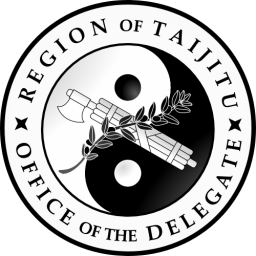Cabinet of Taijitu
| Cabinet of Taijitu | |
|---|---|
| History | |
| Formation | Constitution of Taijitu June 20, 2010 |
| Leadership | |
| Delegate | Myroria |
| Structure | |
| Ministries | Ministry of Community Ministry of Defense Ministry of External Affairs Ministry of Internal Affairs Ministry of Justice |
| Members | Myroria Inglo-Scotia The Crazy Monkeymen St Oz |
| Political groups | Taijitu Nationalist Alliance Independent |
| Selection | |
| Method | Delegate appointment |
| Term length | Indefinite |
| Meeting place | |
| Executive forums | |
The Cabinet of Taijitu is the body responsible for administering Taijitu's executive government. It is primarily composed of a number of ministers appointed by the Delegate to assist them, but is also considered to include the Delegate themselves and the Lieutenant Delegate. The ministers of the Cabinet are responsible for running certain ministries tasked with different executive functions. These ministries and their duties are regulated by the Ministries Act. There is no limit on how long a minister may serve, but they may be removed by the Delegate or a vote of the Senate. The Cabinet currently contains four members and administers five ministries.
History
The Cabinet as originally established by the first constitution of Taijitu favored the executive. Ministers required a two-thirds super-majority vote of the Senate to be removed, instead of a simple majority, and the Senate had no power to compel the creation of certain ministries. This was soon changed by a constitutional amendment on April 16, 2007, which gave the Senate the power to create ministries by law and remove ministers by a simple majority vote.
On March 23, 2008, a coup was used to forcibly instate a new constitution, which gave the Delegate unprecedented powers over the Cabinet. The Senate's legislative replacement, the Citizen's Assembly, was not only unable to create ministries by law, but also unable to remove ministers from office. This constitution, however, was short lived, and the Senate and its controls over the Cabinet were restored in full later later that year by a new constitution.
During a convention to create a new constitution in May of 2010, it was decided to keep the Cabinet as it was under the previous Constitution. This decision was affirmed on June 20 when the new constitution was formally ratified. The Ministries Act was subsequently signed into law on August 2 of the same year, defining the ministries of the Cabinet. This act has since been amended several times, changing a few of the ministries. Most, however, have remained largely unaltered since the act was first passed.
Responsibilities
The Cabinet's sole responsibility is to assist the Delegate in administering their duties. This covers a wide range of disparate tasks. Some of these are explicitly mandated in in the Constitution, such as processing citizenship applications. Others are established by the Ministries Act, executive decree or convention, such as recruiting new nations. In either case, which ministers are responsible for which duties is decided by the Delegate. For some ministries the Delegate's expectations are formalized in the form of written directives while others are operated on an ad hoc basis. If necessary, a single minister is permitted to administer several ministries at a time, or the Delegate or Lieutenant Delegate may personally take charge of one or more.
Ministries
There are presently five formal ministries. All of them are included in the Ministries Act. The Ministries Act also establishes two additional ministries, Recruitment and Regional Security, but these have been combined with the Ministry of Community and Ministry of Internal Affairs by executive decree, as permitted by the act. Currently the Ministries of Internal Affairs and Justice are under the direct control of the Delegate.
| Ministry | Portfolio | Minister | In office since |
|---|---|---|---|
| Ministry of Community |
|
Funkadelia | April 23, 2012 |
| Ministry of Defense |
|
Eluvatar | June 7, 2012 |
| Ministry of External Affairs |
|
Cozulul | June 6, 2012 |
| Ministry of Internal Affairs |
|
None | N/A |
| Ministry of Justice |
|
None | N/A |
Appointment and removal
Ministers are appointed by the Delegate and do not require Senate confirmation to take office. Once appointed, ministers serve indefinitely until their resignation or removal from office, and it is not unheard of for ministers to outlast the delegates who appointed them. They may be removed at the discretion of the Delegate, or by a majority vote of the Senate. Because ministers are unelected, they may not be recalled in a referendum.
See also
| Government of Taijitu | |||||
|---|---|---|---|---|---|
| Legislative | Ecclesia · Citizen-Initiator | Executive | Delegate · Citizen-Diplomats · Citizen-Liaison · Armed Forces . Citizen-Sergeant | Constitution | Constitution |
| Laws | Alliance Between Taijitu and The North Pacific . Citizen-Initiator Act .Citizen-Liaison Act. Citizenship Act . Delegacy Act . Flag and Seals Act · Holidays Act . Judiciary Act . Militia Act . Noble Houses Act . Revolutionary Calendar Act . The Rejected Realms - Taijitu Treaty of Friendship and Cooperation . University of the Revolution Act | ||||
